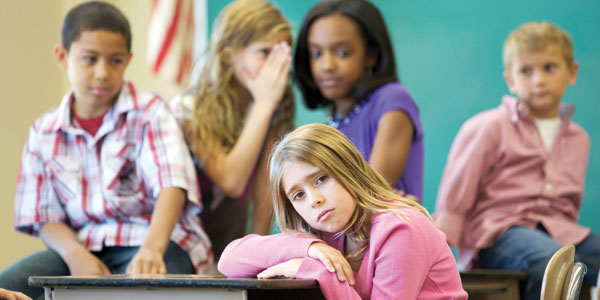
Algunos niños no se dan cuenta el daño que hacen cuando llaman a otros niños con nombres, de acuerdo a Camille Giani, una maestra sustituta de escuela intermediaria.
“Nosotros (los maestros) tratamos de educar a los padres y estudiantes sobre este tema”, dijo Giani. “Es triste cuando se empieza a ver que algo no está bien con un niño y – cuando averiguas el problema tiene que ver con otros niños llamándolos por apodos – cuando empiezas a ir más en profundidad.”
Un problema en las escuelas desde hace muchos años, es el acoso que se ha convertido en un tema de debate nacional en los últimos años. El Centro Nacional de Estadísticas de Educación (NCES) ha informado que hay más incidentes de bulín en las escuelas intermedias que en las escuelas secundarias y escuelas primarias. El NCES también ha informado que la intimidación emocional es el tipo más frecuente de bulín.
De acuerdo con el NCES, los efectos del bulín pueden reflejarse de muchas formas y años después de que este ha tenido lugar. Las víctimas de acoso pueden sufrir de baja autoestima, tener dificultades para confiar en los demás, carecen de asertividad, actuar de forma agresiva, tener dificultad para controlar su ira y aislarse.
Para evitar el bulín, Giani recomienda que los profesores mantengan a sus estudiantes ocupados y organizados.
“Si los niños están haciendo su trabajo y tienen el ambiente adecuado para que aprendan, no se enfrentarán a … (ese tipo de problemas)”, dijo.
De acuerdo con el NCES, otras maneras de combatir el bulín incluye hablar, llegar a las figuras de autoridad, ignorando a los bulíes, y centrarse en los amigos y actividades.
Para ayudar a los estudiantes a lidiar con el bulín verbal, Giani incentiva a los padres a que hablen con sus hijos debido a que el bulín verbal es a veces difícil de notar, dijo.
Para obtener más información sobre cómo detener el acoso, visite http://stopbullyingnowfoundation.org/main/.
_____________________________________________________________________________________________________________________
Verbal bullying as harmful as physical bullying, educator claims
By Paula Alzate
Some kids don’t realize the damage they do when they call other kids names, according to Camille Giani, a middle school substitute teacher.
“We (teachers) try to educate parents and students on this issue,” Giani said. “It is sad when you start noticing that something is not right with a kid and – when you start going more in depth – finding out the issue has to do with other kids calling them names.”
An issue in schools for many years, school bullying has become an issue of national discussion within the past few years. The National Center for Education Statistics (NCES) has reported there are more bullying incidents at middle schools than at high schools and elementary schools. The NCES also has reported that emotional bullying is the most frequent type of bullying.
According to the NCES, the effects of bullying may be reflected in many ways and surface years after the bullying has taken place. Victims of bullying might suffer from low self-esteem, have difficulty in trusting others, lack assertiveness, act aggressively, have difficulty controlling their anger and isolate themselves.
To prevent bullying from taking place, Giani recommends that teachers keep their students busy and organized.
“If kids are doing their work and you have the right environment for them to learn, you won’t be facing … (those kinds) of problems,” she said.
According to the NCES, other ways to deal with bullying include speaking out, reaching out to authority figures, ignoring bullies, and focusing on friends and activities.
To help students deal with verbal bullying, Giani encourages parents to talk to their kids because verbal bullying is sometimes difficult to notice, she said.
For more information on how to stop bullying, visit http://stopbullyingnowfoundation.org/main/.










